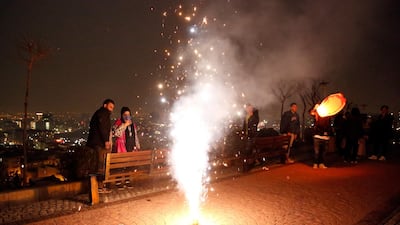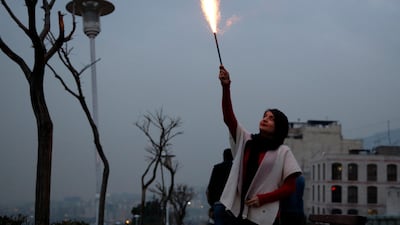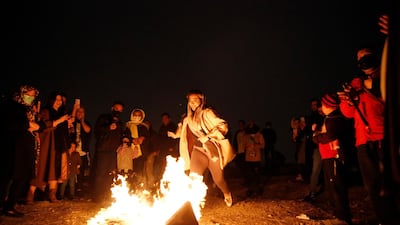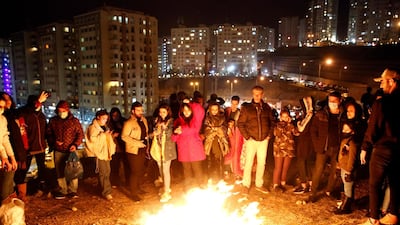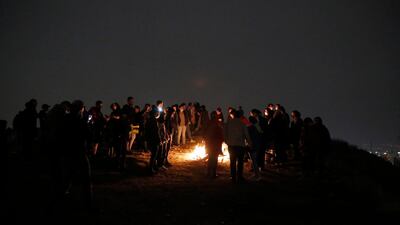A video appearing to show a crowd of young Iranian women dancing to a controversial song at an impromptu street party in Tehran has gone viral online.
The gathering on the eve of Chaharshanbe Suri, which falls before the fire festival of Nowruz, showed two women dancing gracefully as the hit Farsi song Tehran Tokyo blasted out to the throng of young Iranians.
Neither woman appears to be wearing a headscarf, as is required under Iranian law when in public.
Chaharshanbe Suri, or Scarlet Wednesday, falls on the last Wednesday before Nowruz New Year’s celebrations in the Persian calendar and is celebrated widely across Iran despite its Zoroastrian roots.
As well as street parties, people mark the event by lighting bonfires, leaping over flames big or small, and setting off fireworks.
The song by US-based Iranian rapper Sasy Yafteh, known by his stage name Sasy, caused outrage among hardline politicians and officials in Iran when it was released this month for its lyrics on drug use.
Authorities arrested producers connected to Yafteh, his management company and local journalists over the track’s video, which features the American adult film star Alexis Texas.
But the song became an overnight hit when it was released last week and the teaser video alone has had more than 19 million views on Instagram.
“It’s the big hit song right now. It’d only make sense for it to be playing,” said Holly Dagres, senior fellow at the Atlantic Council think tank, who shared clips of the festivities on Twitter.
Despite Iran’s conservative social rules, street parties at which men and women sing and dance are not uncommon on big occasions such as Chaharshanbe Suri.
“Iranians also dance in the streets during big football match wins, like the World Cup,” Ms Dagres said.
It wasn’t an isolated incident, with dozens of clips of people – including other women without headscarves – dancing in the street also appearing online on Wednesday.
In the past, police have used Iran's vaguely defined morality laws to arrest people for dancing in public. Women have also posted videos of themselves dancing in the street as a form of defiance.
But Ms Dagres, and several residents of Tehran who spoke to The National, said such rules are unofficially relaxed during major festivals.
“As long as the fireworks aren’t too big, the police do not come,” said Kouros, 30, who works in tech in Tehran and attended street parties in the capital on Tuesday night.
Melika, a self-employed Iranian resident of Tehran, said this year’s festivities were more subdued than in the past but provided much-needed relief.
“It felt like we all collectively needed to go out, let loose and feel joy. I remember growing up and Chaharshanbe Suri was so intense with all the music and fireworks and the chaos of huge, huge fires. It hasn’t been like that in a while, and this was super-different but still fun and exciting.”
The economy is still reeling from sanctions brought in by former US president Donald Trump, who in 2018 pulled out from the Joint Comprehensive Plan of Action, known as the Iran nuclear deal, and pursued a campaign of “maximum pressure” on Tehran.
The sanctions caused a 6.8 per cent contraction in the Iranian economy last year and an 80 per cent fall in Iranian oil exports.
“People not following Iran closely are always shocked when they see Iranians doing normal things. Even with the advent of the internet and social media, stereotypes about what Iranians look like or do in their daily lives continue to dominate,” Ms Dagres said.
The latest controversy over Tehran Tokyo is not Yafteh's first brush with the authorities. His music has been outlawed in the past and clips he shared online in 2019 showing children in Iranian schools dancing to his songs led Ali Motahari, deputy parliament speaker at the time, to demand the Education Ministry take action against head teachers.
Iranian state media reported on Wednesday that three people died, about 1,900 were injured and 87 lost limbs during Tuesday night’s celebrations across the country.
Police also arrested 25 people for flouting safety rules that ban gatherings during the pandemic.
Iran was the first country in the Middle East to report cases of Covid-19 and has the highest infection and death rate in the region, with 1.7 million confirmed cases and 61,492 deaths.

